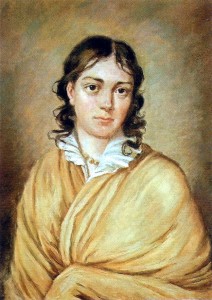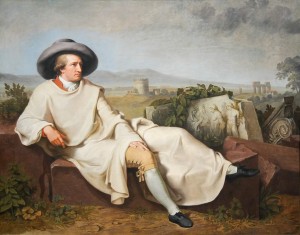It's all about the classical music composers and their works from the last 400 years and much more about music. Hier erfahren Sie alles über die klassischen Komponisten und ihre Meisterwerke der letzten vierhundert Jahre und vieles mehr über Klassische Musik.
Total Pageviews
Tuesday, December 28, 2021
Muses and Musings - Bettina Brentano: Everybody’s Muse!
by Georg Predota , Interlude

Bettina Brentano
© Wikipedia
She aroused the curiosity of Napoleon Bonaparte and went for intimate walks with Karl Marx. She entertained a significant passion for Goethe, who deflected her craving into an extended correspondence and companionship, and she was Beethoven’s muse. Robert Schumann and Johannes Brahms dedicated songs to her, and the Grimm brothers devoted an edition of their fairy tales to her. Who was this incredible woman? Her name was Elisabeth Brentano, better known as Bettina. She was the sister of the famous poet Clemens Brentano, and the wife to another, Achim von Arnim, whom she bore 11 children. She never wrote poetry but her writings outraged and fascinated people, and she also composed music. Her first two songs appeared under the pseudonym “Beans Beor” (blessing, I am blessed). Approaching composition from a literary viewpoint, a number of her songs were published during her lifetime. Young virtuosos and composers like Franz Liszt, Joseph Joachim, Peter Cornelius and Johann Kinkel admired her as a friend of Goethe and Beethoven, and her influence on young musicians was of lasting importance. She was “a supreme muse, a one-woman literary movement, at once among the singular and most representative figures of the Romantic century.”

Johann Wolfgang von Goethe
© travel-target.com
Bettina was born in Frankfurt in 1785, and her mother had been Goethe’s first love. When she died, Bettina was sent to the convent, and eventually her mad brother Clemens—at some point he had painted his entire room, floor to ceiling, including the carpet, curtains, furniture, and his own face blue—became her mentor. Clemens and his friend Achim von Arnim, with substantial help from Bettina, collected folk poems, which they eventually published as the seminal work of German Romanticism, Des Knaben Wunderhorn. Bettina had always been a rebel, and her first love was a girl five years her senior whom she met in the convent. When she was 21, she was introduced to Goethe, and when he asked what interested her, she replied “Nothing interests me but you.” Apparently, “she leapt into his lap, threw her arms around his neck and went to sleep.” She clearly wanted to be his muse, maybe more. She wrote in a letter, “I have been jealous and sometimes I have felt myself to be the subject of your poems – and why shouldn’t I dream myself into happiness? What higher reality is there than dream?” Goethe, over 30 years her senior, did not know how to handle her, so he turned her letters into the materials for his books and poem, “but he kept her at arm’s length.”

© sueyounghistories.com
By 1810, Bettina had made herself known to another great artist of her age, Ludwig van Beethoven. According to her own recollections, “one day as Beethoven was working at the piano, I placed my hands on his shoulders. He turned in anger to find an attractive young woman who spoke melodiously in his ear: My name is Brentano.” Seemingly, Beethoven was enchanted by her forthright manner, and they developed a close friendship but were never lovers. She certainly was determined to bring Goethe and Beethoven together, which eventually happened in a single rather uneasy meeting. In her letters she kept quoting Beethoven and Goethe, but all the words were her own invention! Admirers suggest that Bettina created her own literary genre, the “epistolary novel.”
Bettina’s influence was felt throughout central Europe, and that included support for Johanna Kinkel, the female composer, writer, pianist and music teacher who published about 70 songs for voice and piano. Escaping from an abusive husband, Johann lived with Bettina von Arnim for several months, and helped her with compositions and translation projects. Her first collection of six songs, published under the name “J. Mathieux” is dedicated to her mentor, and the critic Ludwig Rellstab suggested, “She would soon become respected and well known.” Bettina tirelessly campaigned against anti-Semitism, wrote some seriously dangerous political books demanding liberalization of Prussian rule, and was even branded a communist. Her last book, Conversations with Demons almost ruined her financially, and looking at a bust of Goethe she died in her bed at 74. Scholars and critics agree that Bettina von Arnim was unique in a century rich with extravagant characters. “She was everyone’s muse, she craved love from every quarter, but she was never other than her own person. Her greatest creation was herself!”